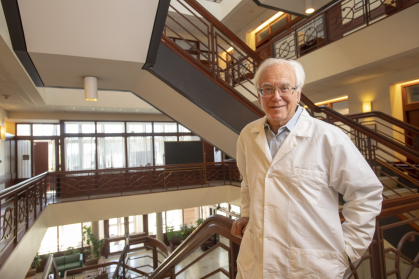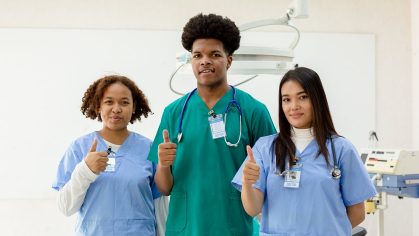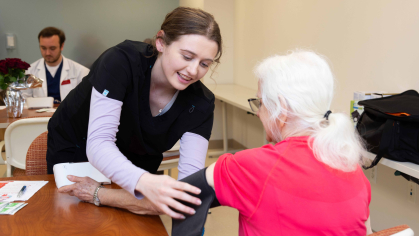Should You Wear a Face Mask to Protect Against the Coronavirus?
Martin Blaser, Rutgers professor of Medicine and Microbiology, explains how it makes a difference

As the number of COVID-19 cases continues to climb in New Jersey and throughout the country, there is debate over whether people should be wearing face masks when they leave home. The Centers for Disease Control and Prevention is now recommending that individuals wear cloth masks in public. Martin Blaser, director of Rutgers University’s Center for Advanced Biotechnology and Medicine and professor of Medicine and Microbiology, says there is clear scientific evidence that masks work, provide some protection against a virus and should be worn.
Should the general public wear masks when they leave their homes?
Yes, everyone should wear a face mask when outside their home and in the company of any other person – it could be at the grocery store, post office, and gas station or even going for a walk in your neighborhood. Anywhere where there is another person within six feet of you.
Why is it important to cover your face?
The main way that this virus is spread is by breathing. It is obvious when someone is coughing, but a large part of its spread is from people who have no symptoms. So you can catch it from anyone. And that is what is happening all over the world, including in the U.S.A. and in New Jersey. It is spreading rapidly and wearing a mask is one way to get at least some protection. It is not 100 percent but it definitely helps and should be done.
If you don't have a surgical-type mask, can something else be used?
I am not certain how well homemade cloth masks protect. There hasn’t been much research in that area. There is probably some protection. It would be less than a surgical mask, but it is likely better than not wearing anything. The best protection is to avoid being near people who are not in your household. The infection is only spread by people and the objects that they may touch and and/or breathe on.
Why are we getting mixed messages about the necessity of wearing masks? What has changed?
We learned about masks from trying to prevent the flu.There was clear evidence that masks worked – the main problem is that people didn't really wear them – they were not really afraid of the flu, so compliance was low. When compliance was high, there was a clear protective effect from the flu.
In the earliest days of the epidemic, the public health authorities, knowing that using a mask does not give perfect protection, sought to dissuade people from wearing masks. In my opinion that was an error ("the perfect is the enemy of the good"). Now a consensus has emerged, finally, that wearing mask is a good idea, and I agree.
What else should we be doing?
It is important to mention the other part of avoiding infection – and that is washing hands. When you go to the grocery store or a public place – wear gloves, or wash your hands when you have finished. When you touch a package that originates from somewhere else, wash your hands.
Three simple steps will markedly lower your risk of getting infected and passing it on to others and people in your family: social distancing, wearing a mask in public and washing your hands after being outside your home.


